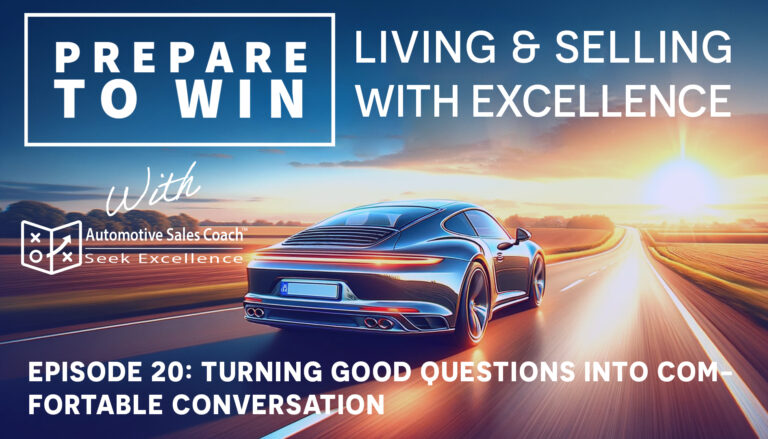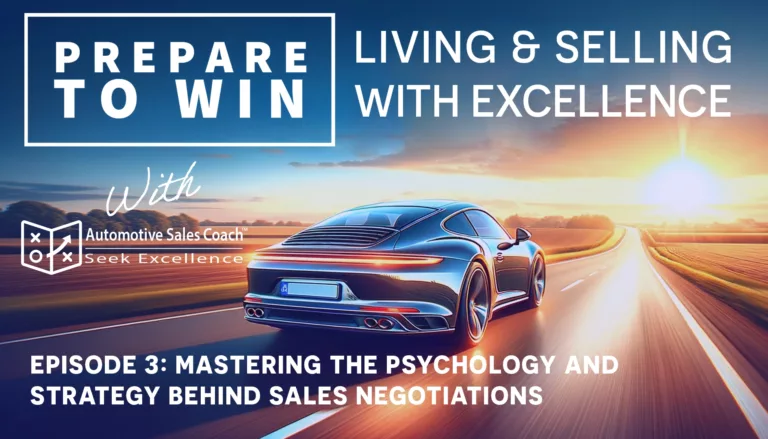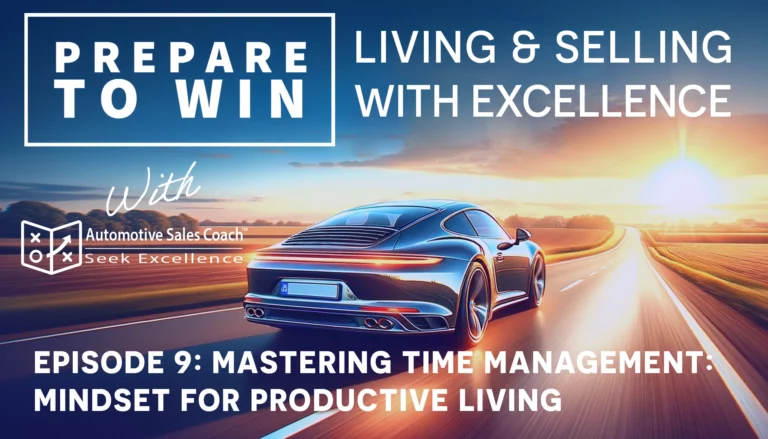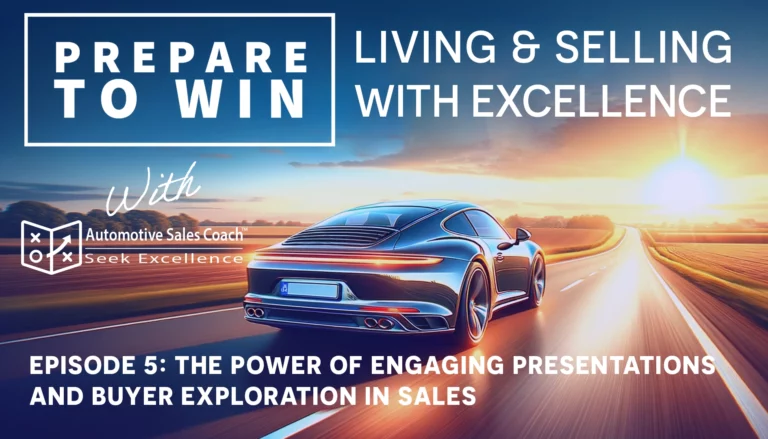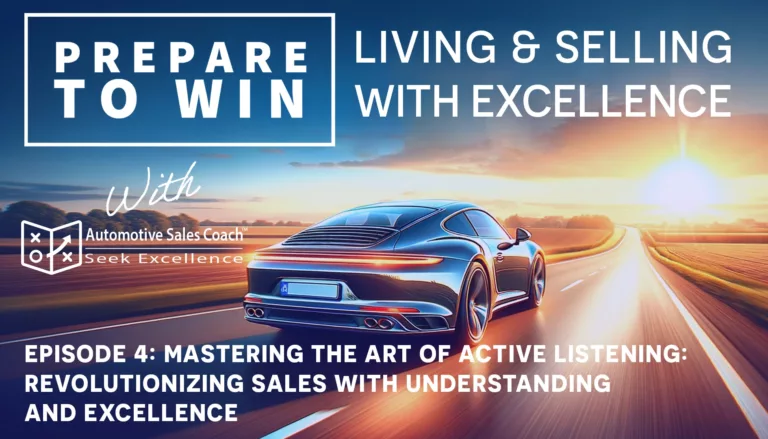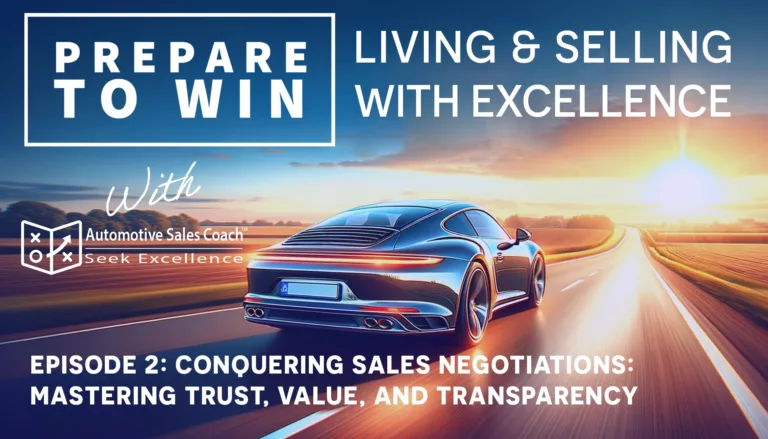Ever wondered why some salespeople click with customers while others struggle? We reveal the power of curiosity in automotive sales and building real connections.
Learn to ask the right questions, build trust, and use psychology for success. It’s not just about selling cars; it’s about connecting with people.
Discover actionable tips from the Automotive Sales Coach’s Dealership Playbook for professional growth. Join us for a journey that resonates with every new lead!
David Lowe: 0:00
Welcome to Prepare to Win. Today, we’re going to talk about something’s really important. Being naturally curious, you’re going to want to stay tuned.
Grace Lupoi: 0:18
Hi guys, I’m Grace and I’m with David Lowe, the automotive sales coach, and we are talking about being naturally curious and that’s something that one of those soft skills we’ve noticed has really been overlooked Right now. Nowadays, we always know what we sometimes, most of the time, fail to know why.
David Lowe: 0:33
Right. So this whole podcast, every episode, we want to deliver what it takes to live and to sell with excellence. Right, and how do you do either without being naturally curious? So this is a big topic and this won’t be the last time we’re talking about it, but it’s kind of I think it’s on everybody’s mind, right, I think. So, being naturally curious, what’s it mean? I think that some of us have this kind of naturally. Somebody says something I just got a boat and we’re like, ah, what kind of boat you got, Why’d you get that? We just, we want to know. Others are like this I just got a boat oh yeah, I used to have a boat and we go off right, Does that make?
Grace Lupoi: 1:15
sense.
David Lowe: 1:16
And so we’ve got these two competing things going on. I think that you may have it as a natural kind of part of your family’s DNA, maybe it’s been passed on, maybe it’s been demonstrated by people in your family where you listen well, right, one of the past episodes talking about active listening, right, and you might just have that natural ability handed down. Or maybe it’s just, like I said, in your DNA where you want to know things, and so you’ve naturally asked questions. And if you don’t, that’s okay. If we’re mindful of it and we know about it, we can improve it, right? So the question is who cares, right? So are you curious about why we talk about naturally curiosity, right? So you mentioned it. Most salesmen today know what the buyer wants. They even know what equipment they want, what color they want, they want it. They even know what they want to pay and what they have for a trade, and what you know and how much they want for that. What, what, what, what, what. And so they’ll come to the sales desk often and somebody will ask them a question Well, why are they trading in a 10,000 mile car? And this consultant will say I don’t know. I guess they wanted a new one. In other words, right. I don’t know, I didn’t care to ask we didn’t ask right, and so this is a big problem. Not being naturally curious costs us customers, which means it costs us deals and costs us money, and it kind of goes on the way that we build relationship and trust. How do we do it?
Grace Lupoi: 2:48
Let them influence you Ask good questions.
David Lowe: 2:51
Ask good questions and we don’t want it to be like 20 questions. I have a list of questions to ask you on my discovery sheet here. One question no, we don’t want that, right, that’s for amateurs. Pros are like hey, I really want to understand you, and when we seek to understand someone, we’re naturally curious about them. They feel understood, they feel valued Another word for feeling values, feeling loved, right. And so we, if we want to build relationship and trust, we definitely have to show interest, don’t we?
Grace Lupoi: 3:25
I agree, and it brings me right to something that you’ve trained me on right. We have the saying of clerks know what closers or consultants know why and it goes back to why our process is so beneficial and so impactful is because we care about that. I don’t want to just know what they want. I’m not a Qdoba order taker. What do? you want right. Why are black rice Beans or no beans? I want to know why. And because we focus on that relationship and trust we have. That principle has been around for thousands of years right, to have influence with somebody, I have to first let them influence me. It’s all back to however long ago that was.
David Lowe: 4:01
Right. So now you just said it, so let’s you just kind of put it all before we talk about, kind of some of the good questions that we’re trying. I think you kind of just said it is to have influence with them. We want to be influenced by them, and isn’t it true that if we want to build value in our product, that we need to relate our products features to their lifestyle? That’s right. How can I relate the value of me, of my dealership, of my product and my pricing? How could I relate that to you if I don’t know you? Right, so many salespeople during the COVID growth spoo made a lot of money without knowing a thing. Maybe you were selling before and there’s this problem before too. People wanted to know what and get right to the money, and when somebody didn’t buy there’s always too much, the price was too high, the payment was too high, they couldn’t do it right. I’m telling you we said it before you don’t lose money over money or deals over money. You lose it over value, right, 90 times out of 100, it’s not an affordability issue, it’s a value issue, meaning I could pay it if I thought it was worth it, right, or I’d take that for my trade, if I really wanted the car, if I thought the car, I don’t think the car’s worth what you’re asking me for. And so if you know what, I guarantee you that the price is probably gonna be too high and the payment’s gonna be too low or too high and the trade’s gonna be too low. But if you know why, then we have something to talk about, don’t we? And it goes through the whole process. So, being nationally curious, now this came to the forefront. I think it was Ted Lasso.
Grace Lupoi: 5:38
That’s right, yeah.
David Lowe: 5:39
And a great show and a lot of funny stuff. But the dart thing he said people always underestimate me, right, and so don’t be judgmental, be curious, right? I think it was the statement. He called it Walt Whitman or something. Of course there was a lot of stuff about that’s misquoted. Walt Whitman never said it. Tv never said hey, we’re gonna be accurate, right, you don’t watch TV for accuracy, I hope you don’t. Hope you watch it for entertainment. And so it was great, entertaining and it really he did make a great point that people often see what they see but they’re not even curious about what they don’t see. The Goldbergs. Adam Goldberg said I’m not an expert, but thank goodness I’ve got very strong feelings about the subject and I think that kind of sums up our world right now. People carried picket signs about something they don’t know anything about. It’d be really kind of cool if we would slow down a little bit and say do I know what I’m talking about? And in life that should be for everything. Why do I believe what I believe? And I might have been curious about why I believe that and researched it for myself or by letting some particular group or some particular media influence and tell me how to think. So being naturally curious is one way we can make our own decisions Free. Will you have that opportunity? But it’s really misused if you don’t ask questions right Now in a selling situation. Wow, if we don’t ask our buyer questions, how are we going to know how to help them? We know what they ask for, but we don’t know what to buy Right, so they come in with it. We know that. So most nine out of 10 people coming in they’ve landed on a car. They did some shopping around. They know what they know, but they don’t know what they don’t know and they’re counting on an expert to show them. Am I buying the right car?
Grace Lupoi: 7:33
Right, that’s it. Who’s the professional here? That’s right, me, as a consultant. Who’s the one leading the situation? It should be me the consultant and. I’m going to lead and have the opportunity to lead, based on how I let my buyer influence me. Ask good questions and use that good information, say hey, you know what, from what you told me, I have some ideas. That’s right. Who wouldn’t trust that that’s right, I know I would. That’s like lead the way, that’s right.
David Lowe: 7:58
So it’s not just, I think, in sales that we’re losing our curiosity. There’s the doctor for my shoulder problem and I got a problem with my shoulder. He says okay, I’ll schedule an x-ray. He didn’t take any time to understand it really. So when they called me, you’ve got some arthritis in your collarbone I’m like what does that mean, right? I don’t really trust it or believe it.
Grace Lupoi: 8:18
According to what?
David Lowe: 8:19
Yeah, and it turns out with an MRI that was inaccurate, but I didn’t trust it from the get go. Based on the questions they asked None.
Grace Lupoi: 8:28
Or lack of questions, right.
David Lowe: 8:30
And so how could I possibly understand it when they don’t right? So we’re really hoping that the experts we trust in our life will slow down enough to understand us. What’s happening and why is it happening? How can I help? And so I think, doesn’t a car customer? They’re buying them. What is it? 50 grand, now average, second most expensive thing they’ll ever buy up to a house, and maybe for some people more, I don’t know. It’s a big deal and they’re making a big person. And then when they come in and talk to you, they’re basically saying I need someone to help me Because if not, I would have pushed the buy button online. And we believe that most people start online and most want to interact with the car and somebody to tell them that you’re doing the right thing. Just a fear still OK, if that’s true about life, it’s probably true right In selling cars. It’s so true all the way through. So I think that we’ve got to decide who am I going to be the clerk or the consultant or the closer? And I could tell you you don’t need training, like almost sales coach, like our dealership playbook. You don’t need any training to sell cars. I know that 90% of salesmen are under trained. And yet in America there’s 15 to 17 million new cars going to be sold by mostly under trained People want cars, they’re going to buy them, work hard. So our training and this whole podcast, every episode we’re not about selling cars, it’s about living with joy, peace and satisfaction. That can only come from pursuing excellence in our life. And how can you pursue excellence in your life without pursuing becoming a master sales consultant If that’s your profession? Whatever you choose to do, do it with your whole heart and mind. So, if you want to be a master sales consultant, do you need empathy? Does your buyer need to say here’s what I want. Can I tell you why I want it and why I want it now, and here’s what I got, and can I tell you why I don’t want it anymore? Isn’t that what we do? Right, absolutely so. Built right into our sales process are these laws of influence. You always talk about social proof, comparison, reciprocity. They’re built in there, and what a lot of people overlook is the psychology of getting the buyer to say I came here to buy this car, and let me tell you why Most salespeople are stuck in the clerk’s zone. Would you please buy my car today if I can get the price of payment low enough? Right? That’s horrible and it’ll be underpaid and when the market shifts, you’re gonna be unemployed anyway. True professionals will slow down and want to know why. So we built these things in and so we walk out there. How can I help you today? I want to look at this. What do we tell them? Rock and roll, I could. What?
Grace Lupoi: 11:26
Totally help you.
David Lowe: 11:27
And then we start asking questions have you bought a car from us before? The point of that question is to do the next thing. How did you hear about us? Right? Really asking is why did you choose us? Isn’t that a motivating factor? They drove by how many dealerships to get to us, so they chose us. Yeah, instead of telling them we’re the best place to buy, why don’t you let them tell you, does that make sense? And then we asked you live around here? Again, we’re looking for I live in town, which is fantastic, will be super convenient. Or I drove 30 miles, boom. What’d they just say? They’re saying to themselves you are worth the drive. Most clerks will never get what we’re talking about and, by the way, if you were a clerk yesterday, did they deserve the right to be better today? I think so, of course. We were all clerks at one time, so don’t be embarrassed about it, and you can make a decision today to be better. That’s what these episodes are all about. Everything in this podcast was dedicated to helping you move to that next step in pursuit of personal excellence. Right, be better today than yesterday. So I think that the psychology is missed of being curious. How, when we ask our buyer questions. When they respond, they’re actually committing to themselves, saying it to the universe, maybe to you too, but it’s most important that they. Here’s why I want this car and here’s why I don’t want the car I have. Here’s why I chose you right.
Grace Lupoi: 13:00
Right and I think you hit it right we talk about sometimes the missing link is not the what to do, but it’s really the why we have consultants all the time. Why am I asking those questions? Oh, I forgot that question and I look at it as a task and I have to ask this question when let’s take a step back. Why am I asking the question in the first place? The psychology of make your customer tell you here’s why I chose you, here’s why I came here. I need your help to get into a new car and get rid of my old car. It’s the psychology behind. Here’s the why we do things, and I just think it’s so cool how intertwined we have it in our sales process, but also in excellence in general.
David Lowe: 13:38
Yeah, just well, I don’t know how you can succeed, really succeed, really work with excellence, reach your full God-given potential in life or sales, without being curious, right, being curious is how we form clear opinions, clear mindset. If we accept the mindset of others, we’re not really free. It’s in our curiosity that we become free. We decide, not somebody else decides. I hear something and I wanna understand that more Before I love it or dismiss it. What am I loving or dismissing? And, as a buyer, why are we saying this is the right car for them? Well, we’re letting them tell us why and even if they haven’t landed on a car specifically maybe it’s a type or a model by getting them to say what’s important to them, what they liked about their old car, what they changed during the silent appraisal, woven throughout our process, throughout it during the exploration hey, what are you gonna put back here? Right, this hatch opens up a lot of room. What are you putting back here? That curiosity that we show throughout our process, right, helps that buyer felt understood and it also gives them a sounding board to say out to themselves. Here’s why I’m doing this. So there’s so much effort to teach people how to close. You say it like this, I think, what they’re really saying let me teach you how to manipulate people who aren’t sold yet you know what I mean, and closing’s a thing, and we have to have a plan and a process. don’t get me wrong. There’s character and integrity, though, and being naturally curious throughout the sales process, truly understanding our buyer and helping relate our buyer’s values, their goals, to our product, showing them how they meet up. Isn’t there a lot of value in?
Grace Lupoi: 15:34
that Absolutely.
David Lowe: 15:35
And then closing is not a chore, it’s not a technique, it’s not a trick, it’s not a strong arm and all the negative reinforced techniques that you see out of so many trainers still today. I mean it’s like grade school level stuff, right, bullies stuff. I’m the biggest one on the playground if I put and yeah, people will get pushed around and buy, but is that really gonna help you feel good about yourself?
Grace Lupoi: 16:01
Right, not me.
David Lowe: 16:02
Joy, peace and satisfaction. I don’t think most people want to sell that way, but a lot of trainers aren’t teaching how to sell with character integrity. Here’s what we know. They’re in the buying timeline, or we wouldn’t be talking to them, true, true. They’re just gonna buy something. That’s not a question of where, or it’s just a question of where, when, what. It’s not a question of. If it’s a question of where, when, what, how much, right, and so if we know and they’ve been online, they’ve been shopping around. We also know they have three fears they don’t want to buy the right, right. So we know all that stuff, do we not? Can we not create a plan to help them feel good about making the decision they want to make Right? That’s what we call excellence in sales. It really stars with care. So listen, if you’re having a discussion and you ask a good question, now go back a couple episodes and listen to the one active listening. We talked about active listening. It’s so critical because being naturally curious requires us to ask good questions. And then what? Actively listen. So listen to what they’re saying, trying to say or not say, so we can formulate a natural good. And, by the way, you all have the skill, I guarantee. On Monday morning you guys are talking about what happened Saturday night and I get you. So who was there? Right, you asked natural follow up questions in life. Why wouldn’t we do it with our buyer, right? So I think this thing of becoming naturally curious would be just slow down and actively listen.
Grace Lupoi: 17:37
That’s it right. And now I was just gonna say that. You took it right out of my mind. So we talked about how. Of course, how I communicate and being naturally curious is that soft skill. And if you’re not there yet, that’s okay. We can still be better today than yesterday. We can get better. And sometimes we struggle with being curious because we’re thinking so fast Right, I’m thinking about the next thing and the next thing and I don’t slow down. So if I slow down and be intentional, I might realize, oh, that’s a good, oh, I’m curious about that. But sometimes we get in such a rush to move fast we skip over it. So if you’re in that position right now, you can take a step back, see where we’re at. How can I get better? Being naturally curious? Part of that is just slowing down a little bit.
David Lowe: 18:20
I love that. That’s great. Speed kills relationships and communication, doesn’t it? So there’s another thing we could practice, and that is, whenever you’re with a friend or a spot family and talking about something, make sure that when somebody says a statement that you don’t respond with a statement, you ask at least one follow-up question. Just start practicing that. So if somebody says we went to dinner last night at this place, your natural tendency oh yeah, we love this one Instead of saying, oh cool, do you guys go there a lot? Practice asking a good follow-up question, and I think that you’re natural, you’re human will come out of you and you will listen, because I think we do want to know each other better. We just been moving so fast and taking it for granted. So it’s a skill set all of us can develop. Maybe we naturally have it and forgot it in the pace of life. Whatever, we can reclaim it. So these episodes are dedicated to helping you be better today than yesterday. And listen. If you dig them, you’re getting some good things from them. Grace, tell you like us, right? I don’t care what platform you’re on. Like us, send us some notes. You can see us on AutoMoe Sales Coach on Facebook. We’re on YouTube. We would love to be a benefit to you. We have our what we think is the most effective, simplest sales train out there dealership playbook Automotive Sales Coach’s Dealership Playbook. That’s out there. If you go to preparetowin. com you can get information on that, and this podcast is all designed to support all that, to help you be better today than yesterday. You know what the more information you have and the more you focus on excellence, the more you head towards it. So we’re trying to give you different ways to gather these principles to help you live with excellence right.
Grace Lupoi: 20:18
That’s right. Is that cool? Sounds great.


